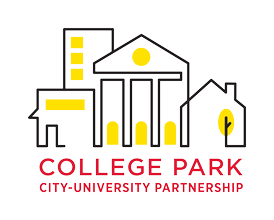Advancing Community Connection: A Collective Imperative in College Park
I’ve been thinking a lot lately about how the College Park City-University Partnership can contribute meaningfully to addressing critical community challenges facing the city. The “grand challenges.” The ones that require new approaches, because they have been pervasive for too long: systemic racism, economic disparity, social isolation, and lack of access to opportunity to name a few. These are issues that hold back members of our community and risk becoming roadblocks on the path to achieving our shared vision. These are big issues that call for big ideas and big action. Sometimes, it seems too daunting. Where should we even begin?
You know the adage? – and apologies in advance to the vegans among us – How do you eat a whale? One bite at a time. And another one? Start where you are.
So, here we are. Right here, in College Park. Let’s take the first metaphorical bite out of the whale:
Did you know that there is an epidemic of crisis proportions happening right here in College Park? (Actually, it’s nation-wide, but let’s keep it local.) Hint: It’s not COVID-19.
It’s loneliness. More specifically, loneliness is attributed to a lack of community connection and social isolation. It’s affecting the well-being of individuals, families, students and neighborhoods. It’s negatively impacting peoples’ physical and mental health, educational outcomes and public safety. It’s woven through the foundations of our community, exacerbating so many other societal issues. It’s right in front of us, invisible, pervasive and devastating.
U.S. Surgeon General: Loneliness
Decreased Life
Expectancy
Living in isolation reduces our chances of survival and social isolation increases the risk for premature mortality by 29%.1,2
Long-Term Impact
on Physical Health
Poor social relationships, social isolation, and loneliness can increase your risk of heart disease by 29% and risk of stroke by 32%.1
Enhancing Long-
Term Health
Being more socially connected can improve stress responses and minimize the negative health effects of stress.1,2
The Surgeon General of the United States Dr. Vivek Murthy highlights loneliness as the most pressing health priority of our time. In the National Strategy to Advance Social Connection , the Surgeon General highlights critical actions that community organizations can take to rebuild social connections. The report asserts that social isolation poses a greater health risk than either obesity or physical inactivity, and is prevalent across age groups, effecting schools and workplaces, neighborhoods and civil society. Two pillars of the national strategy stand out in our work in College Park: strengthening social infrastructure and supporting a culture of connection.
Taking action to strengthen community connections in College Park will take many forms and require initiatives that bridge physical, social and environmental priorities. Fortunately, the Partnership has a track record of action that provides a strong foundation to expand efforts to connect our communities and cultivate deeper social connections in College Park.
Enhancing Connections Through the Built Environment – The Partnership supports a number of initiatives centered on strengthening connections through physical and infrastructure improvements in the city. For instance, we have championed improvements along the Trolley Trail and expansion of the city’s bicycle trail network. Recognizing the importance of strong and connected neighborhoods, we operate a down payment assistance program that has attracted dozens of long-term homeowners to the city and recently launched the Community Preservation Trust to provide additional homeownership opportunities, particularly in neighborhoods threatened by absentee investors.
Establishing and Scaling Community Connection Initiatives – College Park’s residential neighborhoods have long and storied histories of connection, characterized by active neighborhood associations, historic preservation advocates and cultural organizations. The Partnership works alongside neighborhood groups to lift up neighborhood connections through our programs and outreach. Most recently, we attended Lakeland Day to share information about the Community Preservation Trust and reach out to Lakelanders who may be interested in participating in our programs. In June 2023, we brought back Trolley Trail Day after a multi-year pandemic hiatus to ensure that residents and businesses from College Park, Riverdale Park and Hyattsville could all come together to enjoy the trail and celebrate Route 1 corridor connections.
Most importantly for the future, we can foster and sustain community connections through adopting a “connections-in-all” approach in how we advance towards shared goals related to housing and neighborhoods, transportation and mobility, public health and safety, and K-12 education. Connection is at the core of the College Park City-University Partnership. It’s in our name – partnership.
In the face of today’s “grand challenges” we are ready to engage. Read through this month’s bulletin to learn more about our efforts to foster community connections and click through to our websites www.collegeparkpartnership.org and www.communitypreservationtrust.org to dive in deeper and get involved. Connect with us and we can collectively begin where we are. Taking one ‘bite’ at a time to reach our goals.
